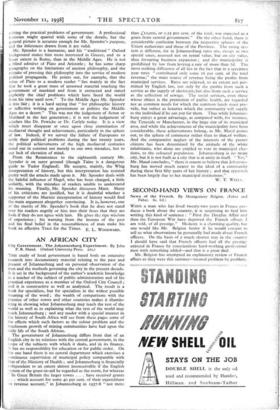AN AFRICAN CITY
This study of local government is based both on extensive research into documentary material relating to the past and present of Johannesburg and on personal observation of the men and the methods governing the city in the present decade. It is set in the background of the author's academic knowledge as a teacher of the subject of public administration and of his practical experience as a member of the Oxford City Council ; and it is constructive as well as analytical. The result is a book for specialists, but for specialists in the widest possible meaning of the word ; the wealth of comparisons with the practice of other towns and other countries makes it illumin- ating in showing what Johannesburg may teach the rest of the world as well as in explaining what the rest of the world may teach Johannesburg ; and any reader with a special interest in the history of South Africa will see from these pages some of the effects which such factors as the colour problem and the mushroom growth of mining communities have had upon the daily life of the South African.
The government of Johannesburg differs from that of an English city in its relations with the central government, in the scope of the subjects with which it deals, and in its finance. It has no responsibility for education or for public order. On the one hand there is no central department which exercises a continuous supervision of municipal policy comparable with that of the Ministry of Health ; and Johannesburg is financially independent to an extent almost inconceivable if the English ystem of the grant-in-aid be regarded as the norm, for whereas ' In Great Britain the larger towns . . . have received grants . . which account for some 40 per cent. of their expenditure n revenue account," in Johannesburg in 1937-8 "not more than ,Cropoo, or 0.25 per cent. of the total, was expected as a grant from central government." On the other hand, there is considerable confusion between the respective spheres of the Union authorities and those of the Province. The rating sys- tem is different, for in Johannesburg rates are, except in two special cases, assessed not on rental value, but on site value, thus favouring business expansion ; and the municipality is prohibited by law from levying a rate of more than 7d. The most striking difference of all lies in the fact that in a specimen year rates "contributed only some 16 per cent. of the total revenue," the main source of revenue being the profits from municipal services. Rates are relieved, to an extent not per- mitted by English law, not only by the profits from such a service as the supply of electricity, but also from such a service as the collection of sewage. The social services, even those whose object is the promotion of public health, are regarded not as common needs for which the common funds must pro- vide, but rather as luxuries which the community will supply to the individual if he can pay for them. Thus while Johannes- burg enjoys a great advantage, as compared with, for instance, the Tyneside or Manchester, in the large size of its municipal area, and while the achievements of the municipality have been considerable, these achievements belong, as Mr. Maud points out, to the sphere of commerce rather than to that.of welfare. And the comparative neglect of the interests of the poorer citizens has been determined by the attitude of the white inhabitants, who alone are entitled to vote in municipal elec- tions, to the coloured population. Johannesburg is no mean city, but it is not built as a city that is at unity in itself. "Yet," Mr. Maud concludes, " there is reason to believe that Johannes- burg has moved much nearer to the ideal of a community during these first fifty years of her history ; and that approach has been largely due to her municipal institutions."
W. T. WELLS.










































 Previous page
Previous page